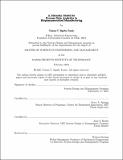| dc.contributor.author | Egaña Tomic, Tomas C. | en_US |
| dc.contributor.other | Massachusetts Institute of Technology. Engineering and Management Program. | en_US |
| dc.contributor.other | System Design and Management Program. | en_US |
| dc.date.accessioned | 2021-10-08T17:10:30Z | |
| dc.date.available | 2021-10-08T17:10:30Z | |
| dc.date.copyright | 2021 | en_US |
| dc.date.issued | 2021 | en_US |
| dc.identifier.uri | https://hdl.handle.net/1721.1/132884 | |
| dc.description | Thesis: S.M. in Engineering and Management, Massachusetts Institute of Technology, System Design and Management Program, February, 2021 | en_US |
| dc.description | Cataloged from the official version of thesis. Page 148 blank. | en_US |
| dc.description | Includes bibliographical references (pages 139-147). | en_US |
| dc.description.abstract | The Biopharmaceutical industry continues to add a record number of life-saving biological therapies every year, which builds up pressure to make their manufacturing processes faster, more consistent, and more productive. Increased digitalization is expected to address these needs by means of new capabilities related to the analysis of the data collected in the manufacturing process (a.k.a. process data analytics). The objective of this work is to research a framework with which to assess the ability of a Biopharmaceutical company to exploit process data analytics in drug substance manufacturing of monoclonal antibodies. A comprehensive view of the potential benefits of process data analytics is provided, as well as a detailed account of the improvements required to realize those benefits. The framework was built using the published information of analytics use cases, the opinions of experienced practitioners of four major biopharmaceutical companies, and other guidelines built to address similar topics in other industries. Throughout the process, a detailed account of the complexities involved in the deployment of process data analytics was captured and explained. Additionally, four approaches driving the value of analytics for biopharmaceutical processing were identified and used to classify the different use cases. The result is a maturity model of the manufacturing site that describes four archetypical states of process data analytics implementation. They are characterized in terms of the mechanics of value creation and the requirements from informational technology (IT), operational technology (OT), and external sources of information. This model provides the basis upon which biopharmaceutical manufacturers or industry consortiums can further specify its content and generate an assessment tool to guide their manufacturing strategies. | en_US |
| dc.description.statementofresponsibility | by Tomas C. Egaña Tomic. | en_US |
| dc.format.extent | 148 pages | en_US |
| dc.language.iso | eng | en_US |
| dc.publisher | Massachusetts Institute of Technology | en_US |
| dc.rights | MIT theses may be protected by copyright. Please reuse MIT thesis content according to the MIT Libraries Permissions Policy, which is available through the URL provided. | en_US |
| dc.rights.uri | http://dspace.mit.edu/handle/1721.1/7582 | en_US |
| dc.subject | Engineering and Management Program. | en_US |
| dc.subject | System Design and Management Program. | en_US |
| dc.title | A maturity model for process data analytics in biopharmaceutical manufacturing | en_US |
| dc.type | Thesis | en_US |
| dc.description.degree | S.M. in Engineering and Management | en_US |
| dc.contributor.department | Massachusetts Institute of Technology. Engineering and Management Program | en_US |
| dc.identifier.oclc | 1263357244 | en_US |
| dc.description.collection | S.M.inEngineeringandManagement Massachusetts Institute of Technology, System Design and Management Program | en_US |
| dspace.imported | 2021-10-08T17:10:30Z | en_US |
| mit.thesis.degree | Master | en_US |
| mit.thesis.department | SysDes | en_US |
